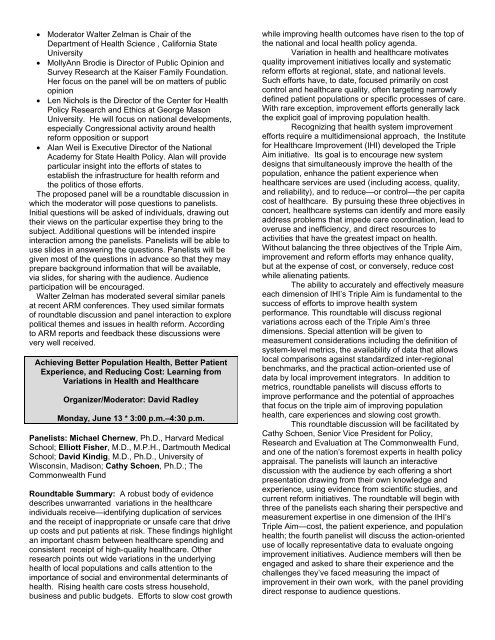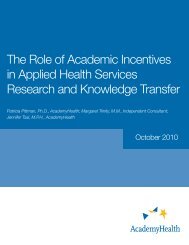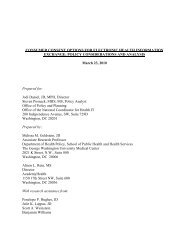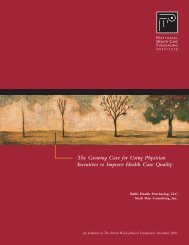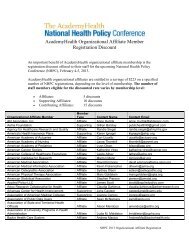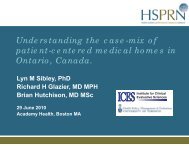Policy Roundtable Abstracts - AcademyHealth
Policy Roundtable Abstracts - AcademyHealth
Policy Roundtable Abstracts - AcademyHealth
You also want an ePaper? Increase the reach of your titles
YUMPU automatically turns print PDFs into web optimized ePapers that Google loves.
Moderator Walter Zelman is Chair of the<br />
Department of Health Science , California State<br />
University<br />
MollyAnn Brodie is Director of Public Opinion and<br />
Survey Research at the Kaiser Family Foundation.<br />
Her focus on the panel will be on matters of public<br />
opinion<br />
Len Nichols is the Director of the Center for Health<br />
<strong>Policy</strong> Research and Ethics at George Mason<br />
University. He will focus on national developments,<br />
especially Congressional activity around health<br />
reform opposition or support<br />
Alan Weil is Executive Director of the National<br />
Academy for State Health <strong>Policy</strong>. Alan will provide<br />
particular insight into the efforts of states to<br />
establish the infrastructure for health reform and<br />
the politics of those efforts.<br />
The proposed panel will be a roundtable discussion in<br />
which the moderator will pose questions to panelists.<br />
Initial questions will be asked of individuals, drawing out<br />
their views on the particular expertise they bring to the<br />
subject. Additional questions will be intended inspire<br />
interaction among the panelists. Panelists will be able to<br />
use slides in answering the questions. Panelists will be<br />
given most of the questions in advance so that they may<br />
prepare background information that will be available,<br />
via slides, for sharing with the audience. Audience<br />
participation will be encouraged.<br />
Walter Zelman has moderated several similar panels<br />
at recent ARM conferences. They used similar formats<br />
of roundtable discussion and panel interaction to explore<br />
political themes and issues in health reform. According<br />
to ARM reports and feedback these discussions were<br />
very well received.<br />
Achieving Better Population Health, Better Patient<br />
Experience, and Reducing Cost: Learning from<br />
Variations in Health and Healthcare<br />
Organizer/Moderator: David Radley<br />
Monday, June 13 * 3:00 p.m.–4:30 p.m.<br />
Panelists: Michael Chernew, Ph.D., Harvard Medical<br />
School; Elliott Fisher, M.D., M.P.H., Dartmouth Medical<br />
School; David Kindig, M.D., Ph.D., University of<br />
Wisconsin, Madison; Cathy Schoen, Ph.D.; The<br />
Commonwealth Fund<br />
<strong>Roundtable</strong> Summary: A robust body of evidence<br />
describes unwarranted variations in the healthcare<br />
individuals receive—identifying duplication of services<br />
and the receipt of inappropriate or unsafe care that drive<br />
up costs and put patients at risk. These findings highlight<br />
an important chasm between healthcare spending and<br />
consistent receipt of high-quality healthcare. Other<br />
research points out wide variations in the underlying<br />
health of local populations and calls attention to the<br />
importance of social and environmental determinants of<br />
health. Rising health care costs stress household,<br />
business and public budgets. Efforts to slow cost growth<br />
while improving health outcomes have risen to the top of<br />
the national and local health policy agenda.<br />
Variation in health and healthcare motivates<br />
quality improvement initiatives locally and systematic<br />
reform efforts at regional, state, and national levels.<br />
Such efforts have, to date, focused primarily on cost<br />
control and healthcare quality, often targeting narrowly<br />
defined patient populations or specific processes of care.<br />
With rare exception, improvement efforts generally lack<br />
the explicit goal of improving population health.<br />
Recognizing that health system improvement<br />
efforts require a multidimensional approach, the Institute<br />
for Healthcare Improvement (IHI) developed the Triple<br />
Aim initiative. Its goal is to encourage new system<br />
designs that simultaneously improve the health of the<br />
population, enhance the patient experience when<br />
healthcare services are used (including access, quality,<br />
and reliability), and to reduce—or control—the per capita<br />
cost of healthcare. By pursuing these three objectives in<br />
concert, healthcare systems can identify and more easily<br />
address problems that impede care coordination, lead to<br />
overuse and inefficiency, and direct resources to<br />
activities that have the greatest impact on health.<br />
Without balancing the three objectives of the Triple Aim,<br />
improvement and reform efforts may enhance quality,<br />
but at the expense of cost, or conversely, reduce cost<br />
while alienating patients.<br />
The ability to accurately and effectively measure<br />
each dimension of IHI’s Triple Aim is fundamental to the<br />
success of efforts to improve health system<br />
performance. This roundtable will discuss regional<br />
variations across each of the Triple Aim’s three<br />
dimensions. Special attention will be given to<br />
measurement considerations including the definition of<br />
system-level metrics, the availability of data that allows<br />
local comparisons against standardized inter-regional<br />
benchmarks, and the practical action-oriented use of<br />
data by local improvement integrators. In addition to<br />
metrics, roundtable panelists will discuss efforts to<br />
improve performance and the potential of approaches<br />
that focus on the triple aim of improving population<br />
health, care experiences and slowing cost growth.<br />
This roundtable discussion will be facilitated by<br />
Cathy Schoen, Senior Vice President for <strong>Policy</strong>,<br />
Research and Evaluation at The Commonwealth Fund,<br />
and one of the nation’s foremost experts in health policy<br />
appraisal. The panelists will launch an interactive<br />
discussion with the audience by each offering a short<br />
presentation drawing from their own knowledge and<br />
experience, using evidence from scientific studies, and<br />
current reform initiatives. The roundtable will begin with<br />
three of the panelists each sharing their perspective and<br />
measurement expertise in one dimension of the IHI’s<br />
Triple Aim—cost, the patient experience, and population<br />
health; the fourth panelist will discuss the action-oriented<br />
use of locally representative data to evaluate ongoing<br />
improvement initiatives. Audience members will then be<br />
engaged and asked to share their experience and the<br />
challenges they’ve faced measuring the impact of<br />
improvement in their own work, with the panel providing<br />
direct response to audience questions.


